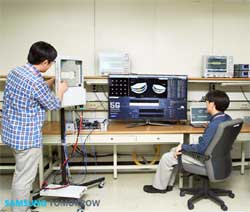
The science ministry said it aims to implement the technology -- about 1,000 times faster than the 4G services currently available -- within six years.
"We helped fuel national growth with 2G services in the 1990s, 3G in the 2000s and 4G around 2010. Now it is time to take pre-emptive action to develop 5G," the ministry said in a statement.
"Countries in Europe, China and the US are making aggressive efforts to develop 5G technology and we believe there will be fierce competition in this market in a few years," it said.
Under the roadmap, a trial 5G service will be rolled out in 2017 and a fully commercial service in December 2020.
Priority will be given to developing key features for the new network, including Ultra-HD and hologram transmission as well as cutting-edge social networking services.
Related industries will be able to rack up sales of 5G-related devices and infrastructure equipment worth 331trn won from 2020 to 2026, the ministry estimated.
The government hopes to implement the plan with investment and co-operation from operators such as SK Telecom and Korea Telecom as well as handset manufacturers like Samsung and LG.
It also aims to expand the telecommunications infrastructure equipment industry, which is relatively weaker than the mighty mobile device sector.
Led by Samsung - the world's top handset maker - South Korea has a leading 30% stake in the global mobile device market.
"But the (telecommunications) infrastructure equipment industry has only a 4.4% share in the global market, with exports very limited," the ministry said.
Chinese equipment makers including Huawei have expanded their presence in the global market from 12% in 2007 to 26% in 2012.
Huawei announced in November that it was looking at a 5G commercial roll-out by 2020, with a minimum investment of US$600m to develop the technology.
Seoul intends to take up to a 20% stake in the world's telecommunication infrastructure equipment market by 2020, according to the ministry.
South Korea is renowned for being at the forefront of Internet technology with broadband speeds that consistently out-pace those in Europe or the United States.
5G technology will allow users to download a 800MB movie file in one second, compared with 40 seconds using 4G, the science ministry said, adding that such speeds would help South Korean firms win overseas deals.
Officials said the new service would also mean people on bullet trains running faster than 500km/h would even be able to access the Internet, compared with 300km/h currently.
"Bullet trains around the world keep getting faster, with some in China running as fast as 600km/h," said one ministry official who declined to be named.
"If we have the technology to allow fast Internet access in these trains, it can open new opportunities for us globally," he said.
Samsung Electronics announced last May that it had successfully tested 5G technology, managing data transmission of more than one gigabyte per second over a distance of two kilometres.
Samsung said it had found a way to harness millimetre-wave bands which have proved to be a sticking point for the mobile industry to date.
The test used 64 antenna elements, which the technology company said overcame the issue of "unfavourable propagation characteristics" that have prevented data travelling across long distances using the bands.
However, it made clear that the technology would not be available commercially before the end of the decade.
Source: AFP via I-Net Bridge

For more than two decades, I-Net Bridge has been one of South Africa’s preferred electronic providers of innovative solutions, data of the highest calibre, reliable platforms and excellent supporting systems. Our products include workstations, web applications and data feeds packaged with in-depth news and powerful analytical tools empowering clients to make meaningful decisions.
We pride ourselves on our wide variety of in-house skills, encompassing multiple platforms and applications. These skills enable us to not only function as a first class facility, but also design, implement and support all our client needs at a level that confirms I-Net Bridge a leader in its field.
Go to: http://www.inet.co.za